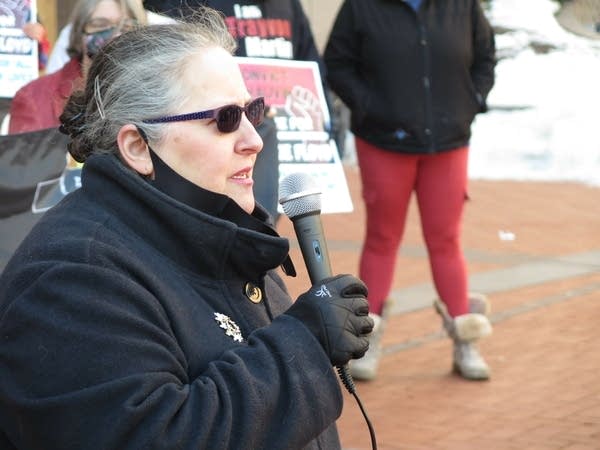Protesters criticize Minneapolis' fortifications on eve of Chauvin trial

Go Deeper.
Create an account or log in to save stories.
Like this?
Thanks for liking this story! We have added it to a list of your favorite stories.
The former police officer charged with killing George Floyd is scheduled to go on trial in Minneapolis next week amid heavy security. City leaders hope to avoid the widespread rioting and looting that followed Floyd’s death last May under the knee of Derek Chauvin. Many racial justice activists plan to demonstrate throughout the trial, and say they will not be intimidated by the massive show of force.
Countless demonstrations have taken place over the years in downtown Minneapolis at the Hennepin County Government Center. Whether its architects intended it or not, the outdoor balcony is a perfect stage, and the sweeping brick plaza fits thousands.
But with Chauvin’s trial on charges of second-degree murder and manslaughter starting soon, this public space is public no more. Workers transformed it into something reminiscent of Cold War-era Berlin. The grounds are encircled with concrete barricades, chain-link fencing and razor wire.

Michelle Gross with Communities United Against Police Brutality gathered at the government center with other activists before the area was sealed off. Gross said city leaders are sending the wrong message, but they won’t deter demonstrators.
Turn Up Your Support
MPR News helps you turn down the noise and build shared understanding. Turn up your support for this public resource and keep trusted journalism accessible to all.
“They are more afraid of the people than they are of police violence. They want to make it seem like the protesters are the problem, not the police violence that led to our protests,” Gross said.

As many as 1,100 police from a dozen agencies will patrol Twin Cities streets, and several thousand National Guard members will help them.
Across the street at City Hall, carpenters spent a sunny winter day boarding up windows and doors. At a news conference inside, Mayor Jacob Frey said the large security presence is not meant to thwart peaceful protests, but to protect people and property.
“Safety is a top priority through this very difficult time in our city. We need to make sure that our communities, our businesses, families throughout the city are safe and feel safe regardless of where they live and regardless of where they work,” Frey said.
Critics say the mayor and Gov. Tim Walz — both Democrats — were slow to respond to the unrest after Floyd was killed last May. Protests were initially peaceful, but in the days that followed, rioters looted and burned scores of buildings and caused an estimated half-billion dollars in damage.
Elvira Espinoza is glad to hear about the beefed up patrols. She owns La Alborada Market, a Mexican restaurant and grocery on Lake Street that’s about a half mile from the 3rd Precinct police station, which rioters torched last May after officers retreated.
With granddaughter Chelsy Solis-Cruz interpreting, Espinoza, 70, says their store did not burn, but no one was there to stop the looters.
“When the break-in happened, we were at home watching the cameras and they were nervous calling the police,” she recalled. “Over 50 people came, coming in and out stealing stuff.”

Insurance covered very little, so the family had to spend thousands of dollars of their savings to reopen. The market is bustling again, but Espinoza said the destruction was so traumatizing that she was only able to return to work last week.
City Council member Phillipe Cunningham said a lack of law enforcement also left many Black-owned businesses in his north side ward vulnerable. But now, Cunningham said he’s concerned the city is overdoing it.
“How do we make sure that we don’t have a protection gap in the same kind of way, but not do so in a way that’s so heavy-handed that it actually makes folks feel unsafe in a different kind of way?” Cunningham said.

As part of a wider plan to combat disinformation, the city was going to pay what it called “social media influencers” $2,000 each to share "city generated and approved messages.” But city leaders scuttled the plan after enduring withering criticism on social media.
While there will be a visible police and military presence throughout the legal proceedings, officials say the full contingent won’t be out until a verdict is near. With three weeks set aside for jury selection, the Chauvin trial is expected to stretch well into April.


